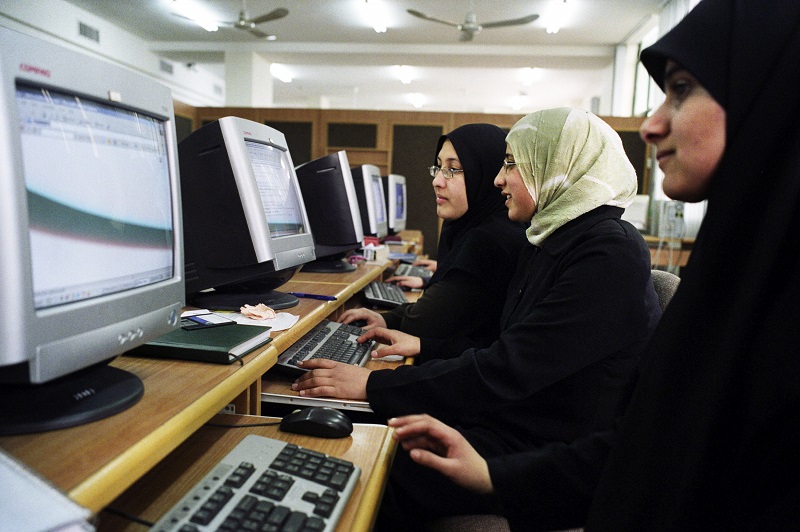Something fascinating is happening in Gaza. In the midst of alarmingly high poverty rates, a decimated economy and ongoing control under the militant Islamic movement, Hamas, a new story is emerging: Gaza is establishing a tech hub.

The potential of digital technology to help people escape poverty and alter how Gazans interact with conflict has caught the attention of international media outlets all over the world. This blog explores the extent to which digital technology can act as an economic enabler in tough contexts.
Behind the headlines
Founded in 2011 by Google and an NGO called Mercy Corps, supported by UK-based non-profit Founders and Coders, Gaza Sky Geeks aims to side-step the blockade in Gaza which prevents the movement of goods and people. Young Gazans are being trained in coding and software development, internationally sought-after skills in the IT sector. They are then taught how to pitch to clients all over the world, using their skills to work freelance without leaving the state.
The trading deadlock resulting from the blockade implemented by Israel and Egypt led to closure of many traditional Palestinian family businesses such as fishing and carpentry. Unemployment in Gaza rose to 70 per cent amongst youth and 80 per cent of Palestinians in Gaza now depend on humanitarian aid.
Can digital technology work as an economic enabler in Gaza?
Cracking the code has led to new possibilities for Gaza’s youth. Women and girls in particular have featured in media interviews, talking about their newfound skills, a progressive development in a state where women are marginalised.
Young Gazans are making the most of a global skills shortage by upskilling in this industry. This helps them to connect with digital media giants such as Google, as well as small firms who engage with the internet. New, digitised modes of transaction enable instant payment and accountability. With the support of Google and more recently, Microsoft, a new market has emerged in coding and development in Gaza. Furthermore, online matching platforms allow students of Gaza Sky Geeks to match their skills to international demand online.
However, this is not Silicon Valley
Whilst it’s a great PR story for Google, this tech-hub-come-fairytale is bringing challenges for Gazans too. Digital tech markets cannot include everyone, and the majority of the population are left unemployed. Most students at Gaza Sky Geeks appear to already have a degree in Information Communication Technologies and are able to use the training to further their prospects. In developing countries, the ICT sector accounts for around 1.1 per cent of work forces and automation lands technology buffs themselves out of business. To participate in this world, you have to be educated and connected, criteria which often leave many behind.
The World Bank’s 2016 Development Report places high importance on ‘analog complements’ to digital development, this is strengthening regulations to ensure competition among businesses, ensuring institutions are accountable, and adapting worker skills to a new digitally advancing economy. However, Israel holds the power over internet connections in Gaza, making accountability very difficult to govern. In fact, Palestine ranks 123/176 on the ICT Development Index 2017 (published by the United Nations), whilst Israel ranks 23/176. It has been speculated that Israel prevents the development of digital technology and could be a contributor to the limited progression of Gaza Sky Geeks since they set up in 2011.
‘Blockade as usual’ in Gaza has been a catalyst for the rise of a digital industry in this conflict affected, fragile state
Whilst its success is commendable, many are left behind, and the scarcity of food, shelter, safety and sources of livelihoods for Palestinians in Gaza are a constant strain. Inequality between those with the skills and the digital facility, and those who don’t, will only widen as this new market grows.
Beyond the broadband
2019 marks the twelfth year of blockade in Gaza. It is clear, through startups like Gaza Sky Geeks, that the youth are determined not to become lost generations due to the ongoing conflict. Despite the challenges posed by digital technology, this tech hub, which inspires likenesses to trendy Hackney start-ups (Independent) and Silicon Valley in international media, symbolises the hopes and capabilities of innovative, intelligent, young Palestinians. However, a long-term solution is necessary and increasingly urgent. In a state where 70 per cent live below the poverty line, international pressure needs to enable Palestinians to escape poverty and suppression, supporting the futures of all civilians living in Gaza.
Young Gazans who have the skills and the accessibility are taking their futures into their own hands. This initiative reveals a path for collaboration amongst the private sector, NGOs and civil society toward sources of livelihoods in Gaza. Cooperation to extend to other sectors will be key to the success of future generations in Gaza.
Rebecca Webb is an IDS MA Development Studies student. Prior to studying at IDS she worked as a Communications Officer in both Nepal and Tanzania for sustainable development NGO, Raleigh International.